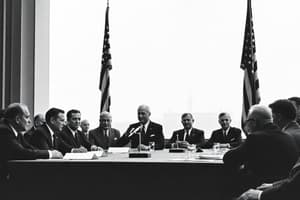Podcast
Questions and Answers
What was Washington's Neutrality Proclamation?
What was Washington's Neutrality Proclamation?
- A formal announcement declaring the United States neutral in the conflict between France and Great Britain (correct)
- A speech given to Congress
- A treaty with Spain
- A declaration of war against France
Who was Citizen Genet?
Who was Citizen Genet?
A French diplomat who tried to draw the United States into the war between France and England
What did Jay's Treaty stipulate?
What did Jay's Treaty stipulate?
Britain was to pay for American ships seized in 1793, Americans had to pay debts owed to British merchants, and Britain agreed to remove troops from the Ohio Valley.
What was the result of the Battle of Fallen Timbers?
What was the result of the Battle of Fallen Timbers?
What was the Whiskey Rebellion?
What was the Whiskey Rebellion?
What was Pinckney's Treaty?
What was Pinckney's Treaty?
What is the Wilderness Road?
What is the Wilderness Road?
Who was Daniel Boone?
Who was Daniel Boone?
What did Washington's Farewell Address warn against?
What did Washington's Farewell Address warn against?
What was significant about the election of 1796?
What was significant about the election of 1796?
What was the XYZ Affair?
What was the XYZ Affair?
What did the Convention of 1800 achieve?
What did the Convention of 1800 achieve?
What were the Alien and Sedition Acts?
What were the Alien and Sedition Acts?
What happened during the election of 1800?
What happened during the election of 1800?
What is meant by 'packing the court'?
What is meant by 'packing the court'?
What was the Report on Manufactures?
What was the Report on Manufactures?
What is the Virginia Plan?
What is the Virginia Plan?
Flashcards are hidden until you start studying
Study Notes
Washington's Neutrality Proclamation
- Issued on April 22, 1793, by President George Washington.
- Declared U.S. neutrality in the conflict between France and Great Britain.
- Threatened legal action against Americans assisting warring nations.
- Led to the Neutrality Act of 1794.
Citizen Genêt
- French diplomat who attempted to involve the U.S. in the war between France and England (1763-1834).
Jay's Treaty
- Negotiated by John Jay to resolve tensions with Britain.
- Britain to compensate for seized American ships.
- U.S. responsible for debts owed to British merchants from before the Revolution.
- Britain agreed to withdraw troops from the Ohio Valley.
The Battle of Fallen Timbers
- Fought in 1794 between American Indians and the United States.
- Resulted in U.S. control over the Northwest Territory and facilitated westward expansion.
Whiskey Rebellion
- Farmers in Pennsylvania revolted against Hamilton's excise tax on whiskey.
- President Washington led troops to suppress the rebellion.
- Demonstrated the new government's ability to respond effectively to challenges.
Pinckney's Treaty
- Agreement between the United States and Spain.
- Redefined Florida's borders and facilitated easier access to the port of New Orleans for American ships.
The Wilderness Road
- A trail created by Daniel Boone through the Cumberland Gap, facilitating westward migration.
Daniel Boone
- Pioneer and explorer (1734-1820) known for crossing the Appalachian Mountains into present-day Kentucky and Tennessee.
Washington's Farewell Address
- Warned against involvement in European affairs, permanent alliances, formation of political parties, and sectionalism.
Election of 1796
- John Adams won the presidency while Thomas Jefferson became Vice President.
- Resulted in political tensions due to their affiliation with opposing parties.
- Modern elections ensure running mates are chosen together, preventing similar conflicts.
XYZ Affair
- Incident in 1798 involving American delegates and French agents during negotiations over treaty disputes.
- French agents demanded a bribe, leading to public outcry when President Adams revealed the incident using placeholders “X, Y, Z”.
Convention of 1800
- Conference that ended naval hostilities between the U.S. and France.
- Freed the U.S. from its prior alliance with France and led to forgiveness of $20 million in damages.
- Resulted in political fallout for Adams, contributing to his loss in the 1800 election.
Alien and Sedition Acts
- Series of laws passed by Federalists in 1798.
- Allowed for the imprisonment or deportation of foreign citizens and prosecution of critics of the government.
- Controversial acts, denounced by Thomas Jefferson; one act remains in effect today.
Election of 1800
- Thomas Jefferson and Aaron Burr tied in Electoral College votes, leading to a decision by the House of Representatives.
- Jefferson elected as President and Burr as Vice President, spurring the creation of the 12th Amendment to clarify voting procedures.
Packing the Court
- Strategy involving the appointment of judges from a single political party, ensuring political control.
Report on Manufactures
- Submitted to Congress by Hamilton to establish an economic policy for fostering industry.
- Proposed protective tariffs on imported goods to support domestic industry, influencing future industrial policies despite lack of immediate action by Congress.
The Virginia Plan
- Proposed a strong national legislature with two chambers, an executive chosen by the legislature, and a judiciary appointed by the legislature.
- Aimed at creating a more effective federal government structure.
Studying That Suits You
Use AI to generate personalized quizzes and flashcards to suit your learning preferences.




